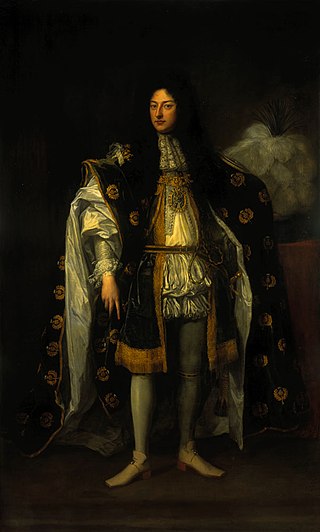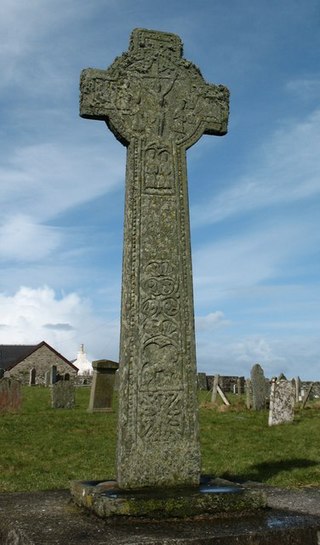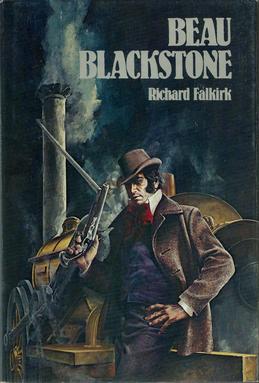Related Research Articles

The Declaration of Arbroath is the name usually given to a letter, dated 6 April 1320 at Arbroath, written by Scottish barons and addressed to Pope John XXII. It constituted King Robert I's response to his excommunication for disobeying the pope's demand in 1317 for a truce in the First War of Scottish Independence. The letter asserted the antiquity of the independence of the Kingdom of Scotland, denouncing English attempts to subjugate it.

In criminology, corporate crime refers to crimes committed either by a corporation, or by individuals acting on behalf of a corporation or other business entity. For the worst corporate crimes, corporations may face judicial dissolution, sometimes called the "corporate death penalty", which is a legal procedure in which a corporation is forced to dissolve or cease to exist.
Ferchar mac Connaid was king of Dál Riata from about 642 until 650.

Henry Dundas, 1st Viscount Melville, PC, FRSE, styled as Lord Melville from 1802, was the trusted lieutenant of British prime minister William Pitt and the most powerful politician in Scotland in the late 18th century.

A court of equity, also known as an equity court or chancery court, is a court authorized to apply principles of equity rather than principles of law to cases brought before it. These courts originated from petitions to the Lord Chancellor of England and primarily heard claims for relief other than damages, such as specific performance and extraordinary writs. Over time, most equity courts merged with courts of law, and the adoption of various Acts granted courts combined jurisdiction to administer common law and equity concurrently. Courts of equity are now recognized for complementing the common law by addressing its shortcomings and promoting justice.
The Kirk Party were a radical Presbyterian faction of the Scottish Covenanters during the Wars of the Three Kingdoms. They came to the fore after the defeat of the Engagers faction in 1648 at the hands of Oliver Cromwell and the English Parliament. They purged the Covenanter's General Assembly and army of "ungodly elements" and crowned Charles II as King of Scotland in 1651, in return for his explicit endorsement of their religious and political agenda in the Treaty of Breda (1650).
Edinburghshire was a Scottish county constituency of the House of Commons of the Parliament of Great Britain from 1708 to 1801 and of the Parliament of the United Kingdom from 1801 to 1918.

The University of Northampton is a public university based in Northampton, Northamptonshire, England. It was formed in 1999 by the amalgamation of a number of training colleges, and gained full university status as the University of Northampton in 2005.

John Drummond, 1st Earl of Melfort, styled Duke of Melfort in the Jacobite peerage, was a Scottish politician and close advisor to James II. A Catholic convert, Melfort and his brother the Earl of Perth consistently urged James not to compromise with his opponents, contributing to his increasing isolation and ultimate deposition in the 1688 Glorious Revolution.
Glen O'Hara is an academic historian, who also writes on politics for a number of publications in the United Kingdom. He is professor of modern and contemporary history at Oxford Brookes University.

The Beaton medical kindred, also known as Clann Meic-bethad and Clan MacBeth, was a Scottish kindred of professional physicians that practised medicine in the classical Gaelic tradition from the Middle Ages to the Early Modern Era.
Sir Thomas Martin Devine is a Scottish academic and author, who specializes in the history of Scotland. He is Scotland's most celebrated historian, having been knighted and made and Officer of the Order of the British Empire for his contributions to Scottish historiography. Officer of the Order of the British Empire, and is known for his overviews of modern Scottish history. He is an advocate of the total history approach to the history of Scotland. He is professor emeritus at the University of Edinburgh, and was formerly a professor at the University of Strathclyde, the University of Aberdeen.
Angela Hannah McCarthy is a New Zealand history academic, and as of 2018 is a full professor at the University of Otago.
Bessie Wright was a healer in Perthshire who was accused of witchcraft in 1611, 1626 and then again in 1628.

Beau Blackstone is a 1973 historical thriller novel by the British writer Derek Lambert, published under the pen name Richard Falkirk. It is the third in a series of six novels featuring Edmund Blackstone, a member of the Bow Street Runners in the pre-Victorian era. Blackstone goes undercover amongst a gang of navvies working on a new railway, and is called on for plans to thwart the first Great Train Robbery.
Deborah Anne Cohen is an American historian of modern Europe and Britain. She is the Peter B. Ritzma Professor of the Humanities and Professor of History at Northwestern University.
Alexander Ritchie (1856–1941) and Euphemia Ritchie (1862–1941) were Celtic craft entrepreneurs from Iona, Scotland.
Andrew Mark Davies, FRHistS, FRSA is a British historian. A professor at the University of Liverpool, he specialises in the history of crime, policing and violence in modern Britain.
Events from the year 1299 in Ireland.
References
- ↑ "New University of Northampton vice-chancellor takes up role". BBC News. 2 August 2022.
- ↑ "Anne-Marie Kilday". Personal profile. University of Northampton. Retrieved 2023-10-30.
- ↑ "University of Northampton £5.5m leather institute faces closure". BBC News. 17 October 2023. Retrieved 2023-10-31.
- ↑ "The future of leather education and research in Northampton - International Leather Maker". International Leather Maker - The leading online news and information provider for the global leather industry. 3 October 2023. Retrieved 2023-10-31.
- ↑ https://www.bbc.co.uk/news/uk-england-northamptonshire-67756113
- ↑ Reviews of Women and Violent Crime in Enlightenment Scotland:
- Martin Bergman, Scandia,
- Annmarie Hughes, Journal of Scottish Historical Studies, doi : 10.3366/E1748538X09000375
- Jennine Hurl-Eamon, Social History, doi : 10.1080/03071020902982798, JSTOR 25594394
- Louise A. Jackson, Journal of British Studies, doi : 10.1086/590285, JSTOR 25482854
- Juliette Pattinson, The Scottish Historical Review, JSTOR 23074072
- Robert B. Shoemaker, The English Historical Review, doi : 10.1093/ehr/cen223, JSTOR 20108669
- John Carter Wood, Journal of Social History, JSTOR 40802028
- ↑ Reviews of Cultures of Shame:
- ↑ Reviews of A History of Infanticide in Britain:
- Leah Astbury, Gender & History, doi : 10.1111/1468-0424.12221
- Simon Devereaux, The American Historical Review, JSTOR 43696037
- Elaine Farrell, Social History, doi : 10.1080/03071022.2015.1112969
- Mark Jackson, The English Historical Review, doi : 10.1093/ehr/cev252, JSTOR 43896434
- Nikki Sullivan, Somatechnics, doi : 10.3366/soma.2014.0136
- Samantha WIlliams, Continuity and Change, doi : 10.1017/S0268416016000035
- ↑ Review of Crime in Scotland:
- Hannah Telling, The Scottish Historical Review, doi : 10.3366/shr.2020.0471
- ↑ Review of Histories of Crime:
- David J. Cox, Cultural and Social History, doi : 10.2752/147800412X13270753069127
- ↑ Reviews of Law, Crime and Deviance since 1700:
- Simon Devereaux, Journal of British Studies, doi : 10.1017/jbr.2018.194
- Alison Jay, History, doi : 10.1111/1468-229X.12664
- David Taylor, Social History, doi : 10.1080/03071022.2017.1320141
- Quentin Verreycken, Lectures, doi : 10.4000/lectures.22809
- Charlotte Wildman, "A forensic take on deviance", History Today